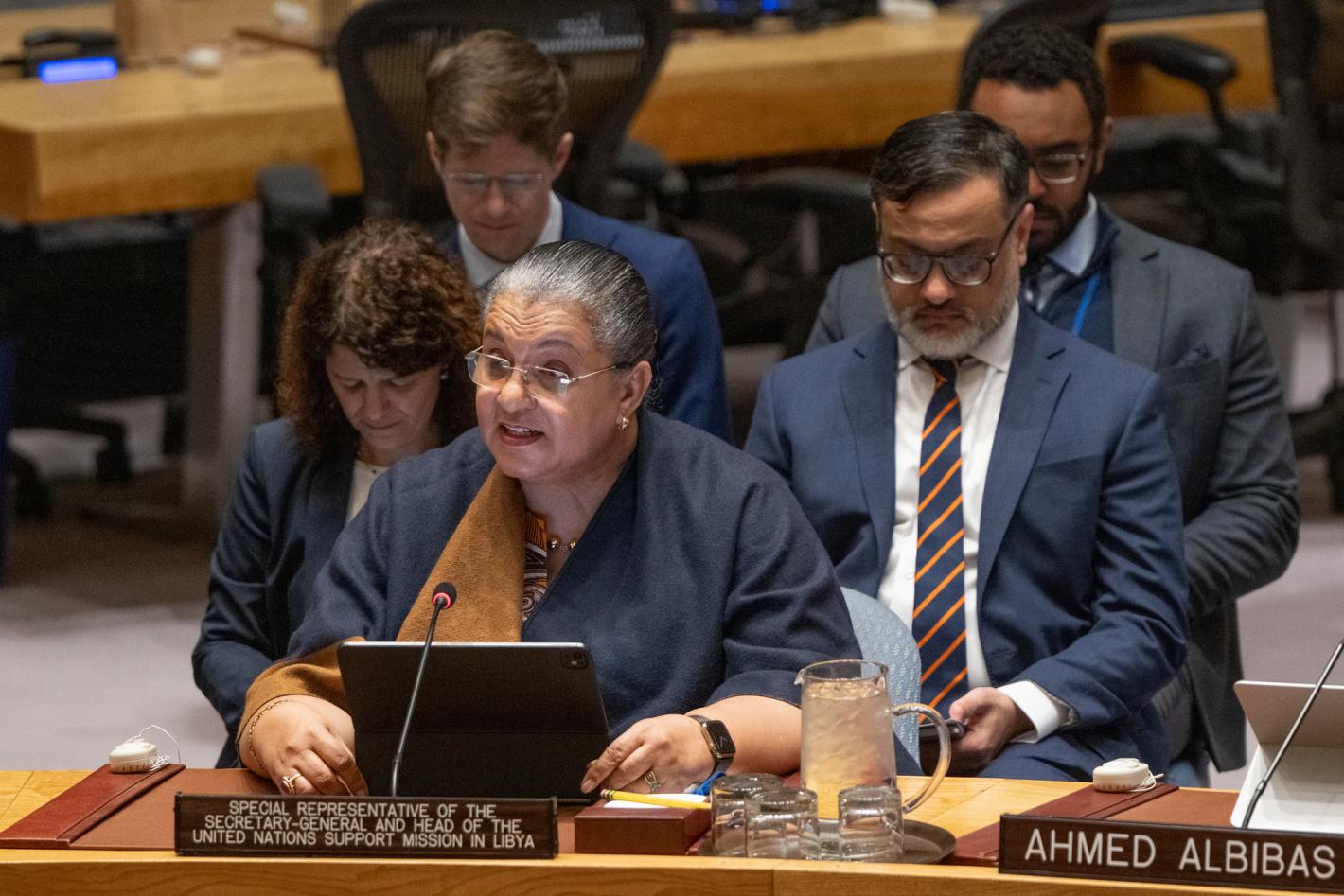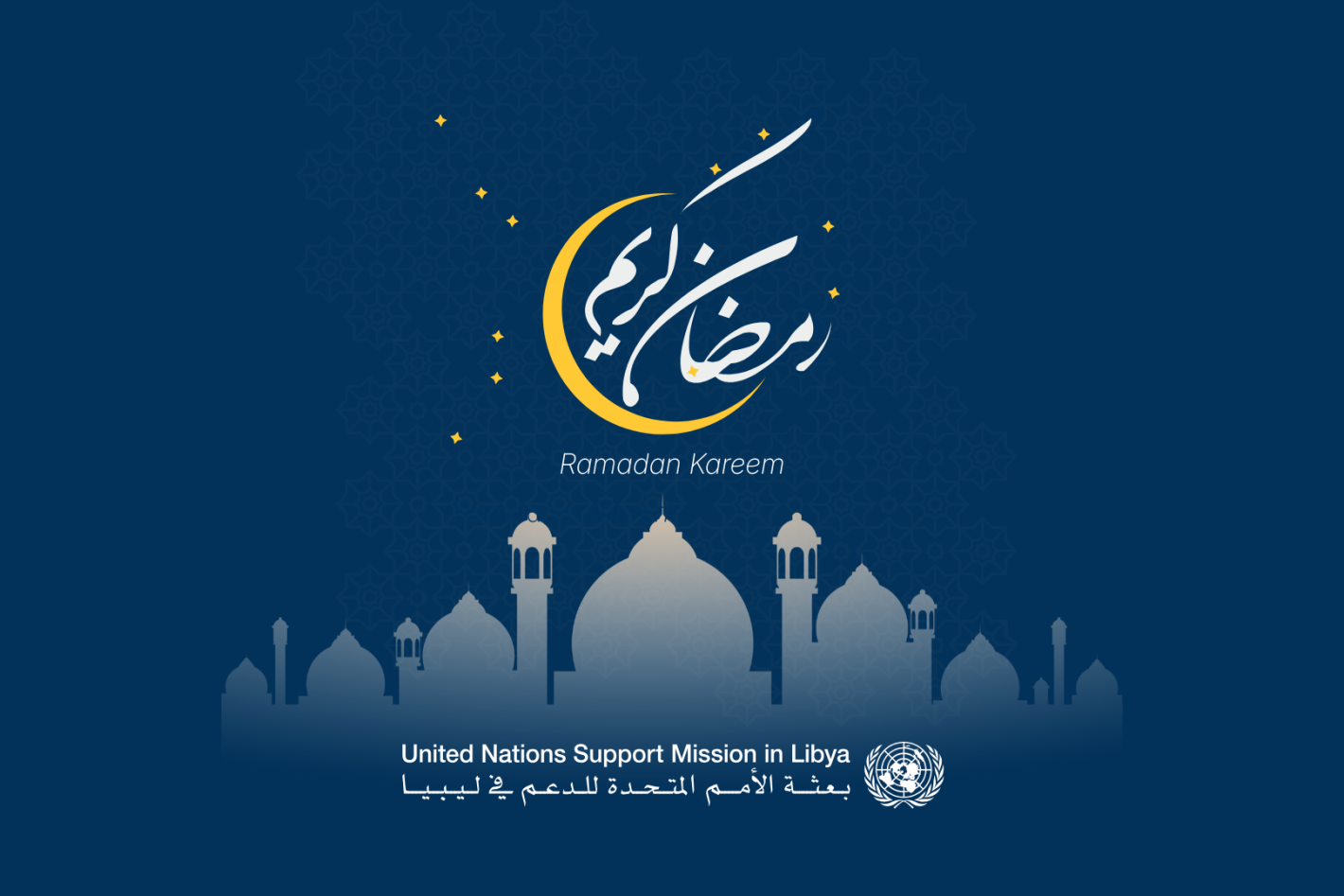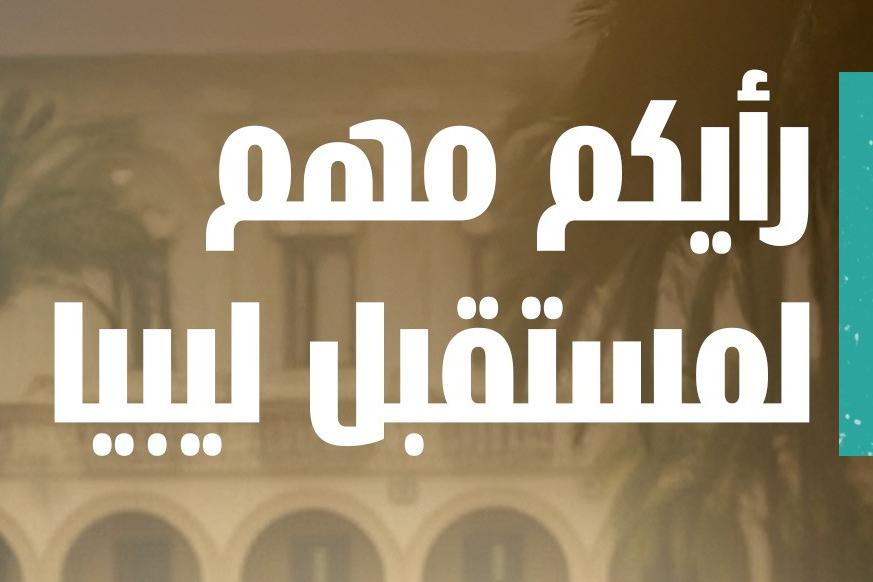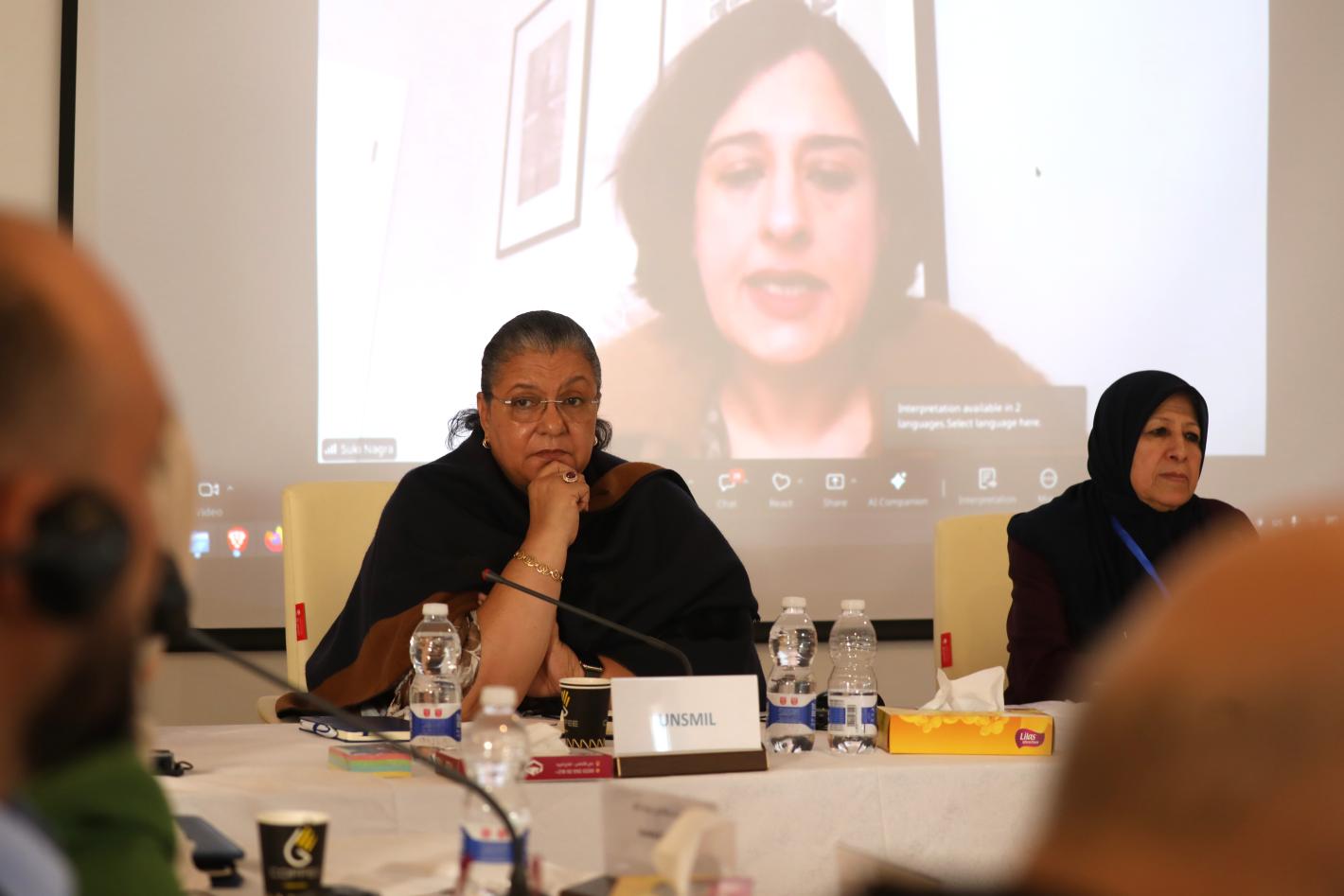السيدة الرئيسة،
بعد يومين، سوف تُحيي ليبيا ذكرى ثورة 17 فبراير 2011. ثلاثة عشر عاماً والليبيون ما يزالون في انتظار تحقيق تطلعاتهم إلى السلام الدائم والديمقراطية.
على الرغم من استكمال الإطار الدستوري والقانوني للانتخابات من قبل لجنة 6+6 المشتركة بين مجلس النواب والمجلس الأعلى للدولة في عام 2023 والمصادقة عليه لاحقاً من قبل مجلس النواب، وهي عملية استغرقت أكثر من 11 شهراً، يبدو أن الأطراف المؤسسية الليبية الرئيسية غير راغبة في حل المسائل العالقة محل الخلاف السياسي لتمهيد الطريق أمام الانتخابات التي طال انتظارها في ليبيا.
ومنذ إحاطتي الأخيرة، واصلت مشاوراتي مع هذه الأطراف الرئيسية، مخاطباً فيهم حكمتهم، وحسهم بالمسؤولية إزاء وطنهم الأم. وحتى الآن، لم يتخذ أي منهم خطوة حاسمة بعيداً عن موقفه الأولي، مع استمرار كل منهم في وضع الشروط المسبقة لمشاركته في الحوار كوسيلة للحفاظ على الوضع القائم، وهو ما يبدو أنه يناسبهم.
- في مناقشاتي الأخيرة مع السيد عقيلة صالح، رئيس مجلس النواب، جدد التأكيد على أن القضية الرئيسية التي ينبغي أن تُطرح على جدول الأعمال هي تشكيل حكومة موحدة، لأن هذا سيكون من الصلاحيات الرئيسية لمجلس النواب باعتباره ”السلطة الشرعية الوحيدة“ المعنية بهذا الشأن، وأنه سوف يشارك فقط في حال إما مشاركة الحكومتين أو استبعادهما معاً.
- يواصل السيد محمد تكالة، رئيس المجلس الأعلى للدولة، رفضه للقوانين الانتخابية كما نشرها مجلس النواب مطالباً بالعودة إلى المسودة التي تم الاتفاق عليها بين أعضاء لجنة 6+6 المشتركة في بوزنيقة. وفي رأيه، ينبغي أن يركز النقاش على تنقيح القوانين الانتخابية لإعادتها إلى ما يسميه ”النسخة الأولية" من النص.
- يصرّ رئيس الوزراء الدبيبة على أنه لن يتنحى عن منصبه الحالي إلا بعد إجراء الانتخابات، ما يعني أن حكومة الوحدة الوطنية التي يرأسها ستشرف على العملية الانتخابية المقبلة.
- يصرّ قائد الجيش الوطني الليبي حفتر على مشاركة كلا الحكومتين في المحادثات أو استبعادهما معاً.
- ولا يريد السيد المنفي، رئيس المجلس الرئاسي، أن يتم اعتباره طرفاً، غير أنه مستعد لأن يلعب دور الميسر دعماً مبادرتي.
السيدة الرئيسة،
إن السبيل إلى الخروج من الأزمة يستلزم حل جميع المسائل التي حالت دون إجراء الانتخابات في عام 2021 من خلال المفاوضات والتوافق على تسوية سياسية بين الأطراف المؤسسية الرئيسية. ولذلك فإنني أحث جميع الأطراف المؤسسية الليبية على المشاركة في الحوار دون شروط مسبقة.
علاوة على ذلك، من الضروري معالجة بواعث القلق والشواغل التي أعرب عنها بعض أصحاب الشأن الرئيسيين، بما في ذلك من خلال إيجاد آلية مؤقتة للإدارة الشفافة والتوزيع العادل للموارد، وتوفير ضمانات لإيجاد أرضية تنافس متكافئة بين جميع المرشحين، وضمانات بأن لا تفرز الانتخابات سيناريو يستأثر فيه الفائز بكل شيء على حساب الآخرين. كما يجب أن تتضمن التسوية السياسية المتوخاة أيضاً خطوات بجدول زمني صارم يفضي في النهاية إلى يوم الاقتراع.
السيدة الرئيسة،
إن الهدف الأساسي لبعثة الأمم المتحدة للدعم في ليبيا، وفقاً للتفويض الذي أنيط بها من قِبل هذا المجلس، هو دعم الأطراف الليبية لتحقيق الاستقرار من خلال تسوية سياسية سلمية. ومن هذا المنطلق، فإنني لن أدعم أي مبادرة من شأنها تأجيج الصراع أو إشعال فتيل حرب تتسبب في إزهاق أرواح الليبيين.
وقد أعربتُ وبشكل ثابت عن استعداد الأمم المتحدة للنظر في أية اقتراحات ومقترحات يمكن أن تفضي إلى حل يقوم على تسوية سلمية وشاملة بين الأطراف المعنية.
السيدة الرئيسة،
إن لهذا المجلس والمجتمع الدولي دوراً بالغَ الأهمية في الضغط على الأطراف الليبية للمشاركة بشكل بنّاء في هذه العملية، كما يكتسي توافقُ مواقف ودعمُ الشركاء الإقليميين أهمية خاصة. وعلى هذا، أكرر دعوتي إلى اتباع نهج موحد ومنسّق من جانب كل أعضاء المجتمع الدولي، حيث لا يمكن للمبادرات الموازية أن تكون ذات فائدة إلا إذا دعمت جهود الأمم المتحدة، لئلا تستغلها الأطراف الليبية كوسيلة لإدامة الوضع القائم.
السيدة الرئيسة،
في مشاوراتي مع شرائح المجتمع الليبي الأخرى، بما في ذلك الأحزاب السياسية، والأعيان، والجهات الأمنية الفاعلة، والمجتمع المدني، والمكونات الثقافية، والنساء والشباب، ومجتمع رجال الأعمال من شرق ليبيا وجنوبها وغربها، سمعت منهم عن مدى الإحباط الذي يشعرون به إزاء الوضع القائم وإزاء عجز قادتهم عن القيام بما هو مطلوب لوضع البلاد على طريق السلام والتقدم المستدامين.
وفي الأسابيع الأخيرة، التقيت مع جهات أمنية مختلفة من الشرق والغرب، كما التقيت مع الأطراف المتعارضة في المشهد الأمني بالمنطقة الغربية، ويبدو جلياً أن لهم تأثيراً على المشهد السياسي. إن قبولهم للعملية ضروري لإجراء الانتخابات، وكذلك التزامهم بالديناميكيات الحقيقية لنزع السلاح والتسريح وإعادة الإدماج وإصلاح القطاع الأمني.
السيدة الرئيسة،
إن استمرار انقسام بين الشرق والغرب في المؤسسات الوطنية سوف ينجم عنه، مرة أخرى، عدم وجود ميزانية وطنية معتمدة يسترشد بها الإنفاق العام، مما يؤدي إلى إدامة غياب الشفافية في استخدام التمويل العام والتوزيع غير العادل لثروات البلاد. كما أنه يزيد من هشاشة الاقتصاد الليبي في مواجهة الاضطرابات الداخلية والخارجية.
لقد عانت المنطقة الجنوبية في ليبيا أيضاً ولفترة طويلة من التهميش الاقتصادي والسياسي الذي يستوجب معالجته. من الأهمية بمكان وجود آليات وطنية شاملة تلبي الاحتياجات الاجتماعية والاقتصادية للجميع بطريقة عادلة.
وقد كان إنشاء اللجنة المالية العليا من قبل المجلس الرئاسي في تموز/ يوليو من العام الماضي مبشراً بأن تكون هذه اللجنة إحدى هذه الآليات. ولكن للأسف، فإن قرار رئيس مجلس النواب بمنع ممثلي المجلس من حضور الاجتماعات أدى إلى عدم تمكن هذه اللجنة من القيام بعملها منذ 16 تشرين الأول/ أكتوبر 2023. وفي الوقت ذاته، شكّل رئيس مجلس النواب لجنة فنية جديدة أنيطت بها مهمة إعادة هيكلة الميزانية العامة ومعالجة القضايا الملحة المتعلقة بتخصيص أموال الدولة. وما زلت أحث جميع الجهات الليبية ذات الصلة على العمل معاً لتحقيق إدارة عادلة وشفافة وخاضعة للمساءلة لإيرادات ليبيا ومواردها.
السيدة الرئيسة،
في حين لم تسجل أية انتهاكات لاتفاق وقف إطلاق النار خلال الفترة التي تغطيها هذه الإحاطة، إلا أن الجمود الذي يحيق بالمسار السياسي ما يزال يعوق التقدم في تنفيذ البنود المُعلقة من هذا الاتفاق، ولا سيما فيما يخص الانسحاب. مع ذلك، وفي تطور إيجابي، أشارت التقارير مطلع كانون الثاني/ يناير الماضي إلى عودة مئات المرتزقة التشاديين والمقاتلين الأجانب من ليبيا إلى تشاد، وذلك في إطار تنفيذ اتفاق السلام التشادي الموقع في العاصمة القطرية الدوحة في آب/ أغسطس 2022. وعلى الرغم من هذا التطور الإيجابي، ما يزال الوضع الأمني العام في جنوب ليبيا مثار قلق مع تَكَشُّف تداعيات الأزمات في السودان ومنطقة الساحل.
وفي طرابلس، ما يزال احتدام التنافس بين الفاعلين الأمنيين لبسط السيطرة الميدانية على مناطق استراتيجية بالعاصمة، بما فيها المناطق التي تضم قواعد عسكرية ومؤسسات للدولة، ومن بينها مصرف ليبيا المركزي، يهدد الوضع الأمني الهش في العاصمة. وتجلت بشكل ملحوظ خلال الأسابيع القليلة الماضية التوترات بين ما يسمى "جهاز الردع لمكافحة الجريمة المنظمة والإرهاب" وما يسمى "جهاز دعم الاستقرار" والتشكيلات المسلحة الأخرى المتحالفة معه.
السيدة الرئيسة،
وفي 1 كانون الثاني/ يناير، أعلنت المفوضية الوطنية العليا للانتخابات عن خطط لإجراء انتخابات محلية في 97 بلدية في جميع أنحاء البلاد هذا العام. وقوبل هذا التحرك بالترحاب من قبل المواطنين في مدن وقرى البلاد. بيد أن حكومة الوحدة الوطنية لم توفر بعد الميزانية اللازمة لهذه العملية بالغة الأهمية. كما يساورني القلق بأنه وفي الأسبوع الأول من شهر شباط /فبراير، صدرت تعليمات إلى أحد عشر مكتباً ميدانياً تابعاً للمفوضية في المناطق الخاضعة لإدارة "الحكومة" المُعينة من قبل مجلس النواب بتعليق العمليات والإغلاق. ويُشكل ذلك تدخلاً غير مقبول في عمليات تضطلع بها مؤسسة وطنية سيادية.
أحث جميع السلطات المعنية على رفع الحظر المفروض على أنشطة هياكل المفوضية الوطنية العليا للانتخابات وأدعو كذلك حكومة الوحدة الوطنية إلى صرف مخصصات الميزانية المرصودة للمفوضية بغية السماح لها بتسريع استعداداتها للانتخابات البلدية.
السيدة الرئيسة،
في 5 شباط/ فبراير، حضرت قمةً في عاصمة جمهورية الكونغو، برازافيل، للجنة رفيعة المستوى المعنية بليبيا والتابعة للاتحاد الأفريقي لتقييم التقدم المحرز في ملف المصالحة الوطنية تحت إشراف الرئيس دينيس ساسو نغيسو. وأثنيت على الاتحاد الأفريقي، بالتشاور الوثيق مع المجلس الرئاسي، على ما بذله من جهد في ملف المصالحة، وشددت على ضرورة دعم نهج للمصالحة قائم على الحقوق ومتجذر في مبادئ العدالة الانتقالية، يشمل جميع الليبيين ولا يتم على حساب المساءلة.
كما حثثت الاتحاد الأفريقي على إرسال فريق متخصص من الخبراء إلى ليبيا قادر على مشاركة خبرته والدروس المستفادة من عمليات المصالحة ذات الصلة في أفريقيا ومناطق أخرى. إن تفعيل مثل هذا الفريق من شأنه أن يساعد الفريق الوطني على القيام بجهوده بطريقة أكثر كفاءة.
وينتابني القلق إزاء مشروع قانون المصالحة الوطنية الذي ناقشه مجلس النواب في 3 كانون الثاني/ يناير، والذي يبدو أنه يتجاوز المجلس الرئاسي بإنشائه آلية جديدة للمصالحة. ويُساورني القلق من أن هذا المقترح الجديد، وفي تعارض مع أفضل الممارسات الدولية، لم تتم صياغته من خلال مشاورات شاملة مع منظمات المجتمع المدني ومجموعات الضحايا، ولا يتضمن ضمانات كافية للحفاظ على الحقوق الأساسية في كشف الحقيقة وإقرار العدالة وجبر الضرر وضمان عدم التكرار.
السيدة الرئيسة،
في إحاطتي الأخيرة، سلطت الضوء على أنه على مدى الأشهر التسعة الماضية قامت الجهات الأمنية باحتجاز ما لا يقل عن 60 فرداً، بينهم أطفال، بشكل تعسفي وذلك بسبب انتماءاتهم السياسية الفعلية أو المفترضة. إن هذه الممارسات تثير شكوكاً حقيقية حول رغبة بعض الأطراف الليبية في دعم عملية سياسية شفافة وشاملة للجميع. يجب الإفراج عن جميع أولئك المحتجزين تعسفاً وعن السجناء السياسيين. ولا شك أن ذلك سيساعد العملية السياسية ومسار المصالحة الوطنية على حد سواء.
إن حالة حقوق الإنسان والوضع الإنساني وأوضاع الحماية للمهاجرين واللاجئين وطالبي اللجوء في ليبيا تثير قلقاً متزايداً، حيث أفادت المفوضية السامية للأمم المتحدة لشؤون اللاجئين والمنظمة الدولية للهجرة عن زيادة كبيرة في أعداد اللاجئين السودانيين الذين دخلوا ليبيا في الأسابيع الأخيرة. وما تزال إمكانية وصول وكالات الأمم المتحدة إلى اللاجئين السودانيين على الحدود الليبية مع السودان محدودة، ولا سيما في الكفرة وفي مراكز الاحتجاز الرسمية. أدعو السلطات الليبية إلى ضمان حرية الوصول دون عوائق إلى جميع الأشخاص الذين يحتاجون إلى الحماية.
كما أنني ما زلت أشعر بالقلق البالغ إزاء استمرار عمليات الطرد الجماعي للمهاجرين واللاجئين عبر الحدود بين ليبيا ودول الجوار. وأكرر دعوتي لسلطات جميع الدول المعنية إلى إنهاء عمليات الطرد القسري التي تشكل انتهاكاً للقانون الدولي. كما أكرر دعواتي لإتاحة إمكانية الوصول الكامل وإجراء تحقيقات مستقلة في جميع الانتهاكات والتجاوزات المزعومة في مرافق الاحتجاز الليبية، حيث تسود أوضاع صعبة بشكل خاص. ومن دواعي التفاؤل أن فريق العمل المشترك بين الاتحاد الأفريقي والاتحاد الأوروبي والأمم المتحدة المعني بوضع المهاجرين واللاجئين في ليبيا قد عاد للاجتماع مرة أخرى لمعالجة الأولويات العاجلة والخطوات التالية للنهوض بإدارة الهجرة في ليبيا.
السيدة الرئيسة،
أرحب بتقرير التقييم السريع للأضرار والاحتياجات في ليبيا للاستجابة للعواصف والفيضانات والصادر عن البنك الدولي والأمم المتحدة والاتحاد الأوروبي في 24 كانون الثاني/ يناير استجابةً للفيضانات الكارثية التي حلت بشرق ليبيا يومي 10 و11 أيلول/ سبتمبر 2023. ويقترح التقرير أسس التخطيط الوطني للتغلب على آثار الكارثة، مشدداً على أهمية التعاون والتنسيق الوثيقين بين أصحاب الشأن الوطنيين مع دعم من الشركاء الدوليين لتعزيز إعادة إعمار المناطق المتضررة وتعافيها بشكل مرن وشامل ومستدام.
وأدعو هنا جميع القادة الليبيين إلى توجيه مواردهم وخبراتهم الجماعية نحو إعادة البناء وإلى إعطاء الأولوية لحياة المتضررين ولسبل عيشهم.
السيدة الرئيسة،
في الختام، أؤكد مجدداً أنه من غير الممكن إحراز تقدم في إجراء انتخابات وطنية ذات مصداقية دون التوصل إلى تسوية سياسية بين الأطراف المؤسسية الرئيسية في ليبيا. وأحث مرة أخرى قادة ليبيا على وضع مصالحهم الشخصية جانباً والجلوس إلى طاولة المفاوضات بحُسن نية وعلى استعداد لمناقشة جميع المسائل الخلافية. إن الإحجام عن ذلك يثير الشكوك ليس فقط حول التزامهم بالانتخابات، وإنما أيضاً حول التزامهم بوحدة ومستقبل بلدهم، الذين هم ملزمون بالخضوع لمساءلته.
ولتفادي انزلاق ليبيا في هوة التفكك كما يُستشرف من خلال العديد من الدلائل المفزعة، ثمة حاجة ماسة وعاجلة إلى اتفاق سياسي بين أصحاب الشأن الرئيسيين لتشكيل حكومة موحدة تسير بالبلاد نحو الانتخابات. أخاطب فيهم حسهم بالواجب الأخلاقي كيف يشرعوا في التفاوض من أجل إيجاد توافق يعيد الكرامة لبلدهم الأم.
شكراً لكم.






